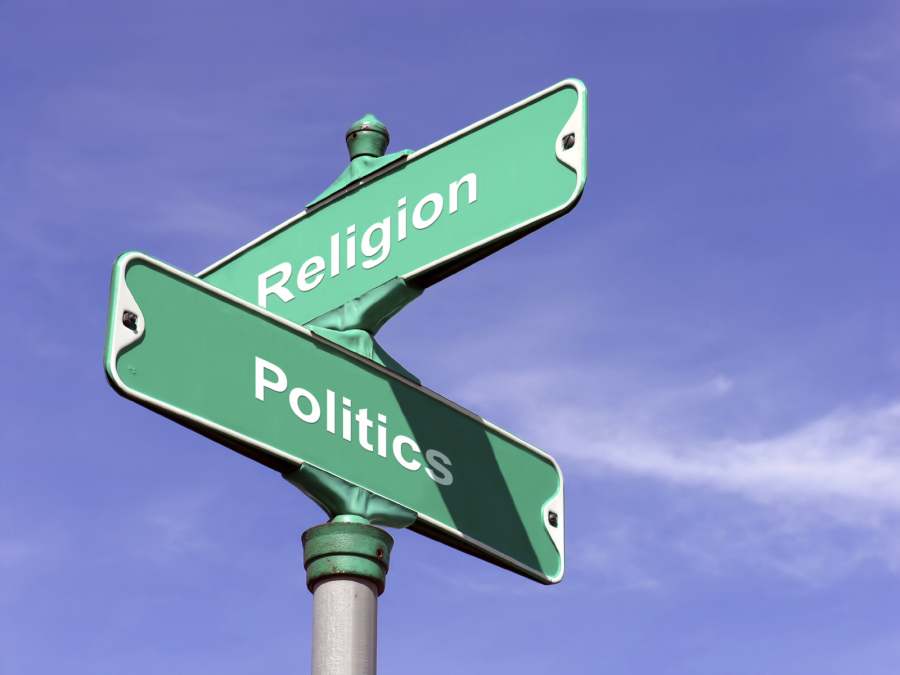‘Evangelicals Are More Involved in Politics Than in the Work and Purpose of Jesus Christ’ — Appearance or Reality?

“American Evangelicalism is no longer seen, in more and more instances, as Christian or part of THE Church. It is viewed as a political entity. This they have done to themselves by being more involved in politics than in the work and purpose of The Church of Jesus Christ.”
So wrote “Jaunita” in a comment here the other day. Is she right? Has politics taken over our Christian ministry? That question has been around at least since 2007, when David Kinnaman and Gabe Lyons published unChristian: What a New Generation Really Thinks About Christianity … and Why It Matters. The culture complained then, too, that we were too political.
Notice, however, what 32-year-old “Brandon” says in the quote with which they open the chapter titled “Too Political”:
20 years ago, when I was looking at Evangelical Christianity from the inside, it seems like a movement bursting with energy to spread good news to people. Looking at it from the outside today, this message seems to have been lost in exchange for an aggressive political strategy the demonizes segments of society.
From the inside he saw ministry. From the outside he sees politics. I ask, “What did he expect? Was that supposed to come as some kind of surprise?”
Appearance Versus Reality
It reminds me of a question people asked me over and over again before the Supreme Court’s Obergefell decision: “If you Christians are so concerned about marriage, why don’t you put as much effort into stopping divorce as you do into stopping gay marriage?”
I always answered bluntly: “You have no idea what you’re talking about.” They didn’t; in fact, they couldn’t have. The very question shows how little they know.
How many sermons do preachers preach on marriage every year? Thousands upon thousands. How many small groups teach on it, pray together, support each other in their marriages? Thousands. How many hours do pastors spend in counseling? Many thousands.
Politics is external, so of course people will see more politics from the outside.
How many marriage conferences and retreats are hosted by Christian groups? Thousands. How many hours of TV, radio, and podcast time are focused on marriage? Thousands! How many nonprofit Christian groups exist solely to support marriage? I don’t know — but I’m guessing thousands again here, too.
Churches at the time focused on marriage ministry over marriage politics by a factor of … thousands! It was mostly internal ministry, though. We don’t do our marriage counseling on FOX News, and we don’t hold our marriage conferences on the street at 1600 Pennsylvania Avenue.
Brandon sees Christianity differently from the outside than he did on the inside. Why should that surprise anyone? That’s just the nature of the activities. Politics is external, so of course people on the outside will see more politics than pastoral care. He was confusing external appearance with internal reality.
Controversial or Culturally Acceptable?
Something else has changed, though, since Brandon was in church. It would have been about 1987, based on his own timeline. Christians had a real political presence then, too — the Moral Majority was formed in 1979 — but the intensity was nothing like it is today. Back then, too, we could realistically call it a majority. Now the weight of opinion has swung far over toward supporting gay marriage, and support for transgenderism and socialism aren’t far behind. (We’re doing somewhat better on abortion, thankfully.)
Uninvolved Christianity is partial Christianity.
So it could be that our politics is more visible now because it’s more unpopular, more controversial. It’s funny, though, how people seem to accept being political when liberal churches promote liberal politics. They’re doing “the Christian thing,” supposedly. Actually, they’re doing the culturally acceptable thing.
Loving Our Neighbor Means Being Involved
Liberal churches are right this far, though: Christianity was never a purely private religion. Its moral system has never been purely private, either. Love for neighbor and obedience to God’s cultural mandates require that we care about the society we live in. Caring about our society means caring about how we’re governed, and caring means involvement.
Uninvolved Christianity is partial Christianity. No one individual can practice total Christianity, but together as a body we must make that our goal, our target.
So Jaunita’s question is wrong on two levels. It’s not just that you can find us doing “the work and purpose of the Church of Jesus Christ” if you look for it in the relative privacy of our church activities. We’re also fulfilling the Church’s purpose in Christ when we do politics.
We have to do it in truth, grace, and integrity, under the guidance of Scripture and the Holy Spirit, naturally. But if it looks unbalanced from the outside, let it look unbalanced from the outside. If others disagree with us, let them disagree. Our job isn’t to look good but to be good; not to be popular but to represent the image of God faithfully.
The world doesn’t set our theology, it doesn’t determine our worship, and it doesn’t define our morality. Let’s not let the world set our priorities or our agenda, either. Less church involvement in politics? The world may not like it, but they don’t have to. We could use more of it.
Tom Gilson (@TomGilsonAuthor) is a senior editor with The Stream and the author or editor of six books, including the recently released Too Good To Be False: How Jesus’ Incomparable Character Reveals His Reality.







